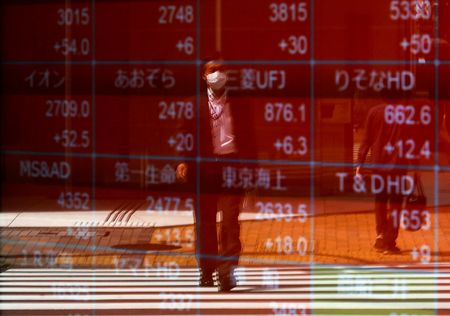 1
1 1
1
By Jamie McGeever
(Reuters) – A look at the day ahead in Asian markets from Jamie McGeever.
Asian market focus on Wednesday turns to Chinese purchasing managers index figures, which will give the first insight into factory and service sector activity in the world’s second largest economy in May.
Japanese retail sales, South Korean retail sales, industrial output and service sector growth, as well as Australian CPI inflation and credit growth reports – all for April – will be released too, potentially giving these currencies a steer.
The flurry of Asian economic indicators comes against the global backdrop of optimism that the tentative agreement in Washington over the U.S. debt ceiling will be passed in both Houses of Congress.
Relief at the 11th hour deal to avoid what would be a catastrophic default gave most markets a lift on Tuesday. This was reflected most in the fall in ultra-short-dated U.S. bills, which fell back in line with the current Fed policy rate and implied near-term market rates.
But it’s cautious relief and optimism. Until the 99-page bill officially passes, there remains the outside chance that it won’t, even though the voting mathematics strongly suggest it will.
Wall Street ended mixed on Tuesday, even though tech and the Nasdaq rose after another jump in Nvdia shares briefly put the chipmaker into the rare club of companies valued at $1 trillion.
Asian markets on Wednesday might also get some relief from the dollar’s slip on Tuesday in line with U.S. bond yields. But it’s a mixed bag for Asian currencies.
Japan’s yen rebounded after the country’s top currency diplomat said authorities are closely watching currency moves and won’t rule out any options. The meeting of officials from the Treasury, central bank and financial watchdog came as the yen slid to a six-month low through 140.00 per dollar.
U.S. futures market positioning data shows that hedge funds are holding their largest net short yen position since October last year. Taking that and Tokyo’s warning on FX together, the yen’s rebound could continue this week.
A catalyst for a similar snap higher in the Chinese yuan, however, does not appear to be on the immediate horizon. Chinese blue chip stocks and Hong Kong tech stocks closed up on Tuesday, but not before printing fresh six-month lows.
China’s PMI figures for May are expected to show another contraction in manufacturing activity. Service sector activity has been expanding since January, however, and it will be the extent to which that accelerates or slows that markets will be most attuned to.
China’s post-lockdown economic recovery has fallen far short of investors’ and policymakers’ expectations. The PMI figures will show if that trend is continuing or not.
Here are three key developments that could provide more direction to markets on Wednesday:
– China PMIs (May)
– Australia CPI inflation (April)
– Japan retails sales (April)
(By Jamie McGeever)